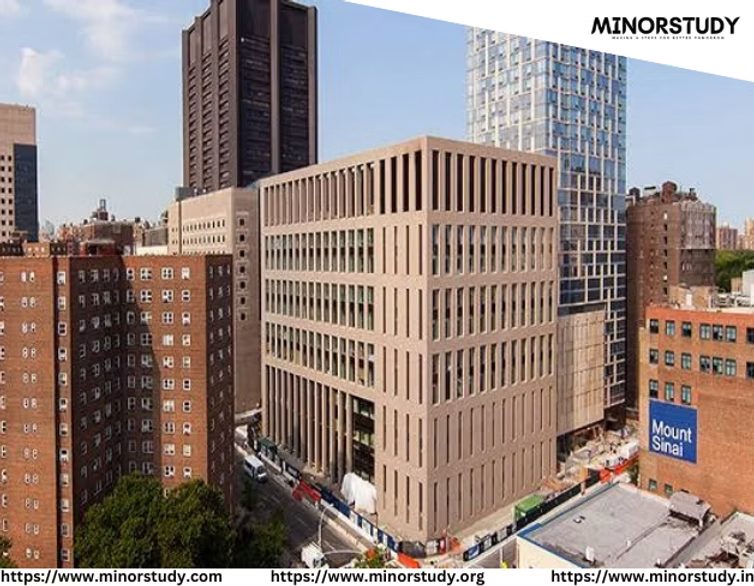The Icahn School of Medicine at Mount Sinai (ISMMS) is a prestigious medical school located in New York City, part of the Mount Sinai Health System. Known for its commitment to academic excellence, cutting-edge medical research, and patient-centered care, the Icahn School of Medicine is recognized as one of the leading institutions in medical education, health science research, and clinical care.
Key Features of Icahn School of Medicine at Mount Sinai:
History and Overview:
Founded in 1963, the Icahn School of Medicine is part of the Mount Sinai Health System, which has a long-standing reputation for medical care and research.
The school is named after Carl Icahn, a notable philanthropist and financier, who donated a significant amount to the institution, allowing for increased investment in medical education and research infrastructure.
Academic Programs:
Doctor of Medicine (MD): The MD program is one of the flagship offerings of the Icahn School of Medicine, focusing on clinical education, research, and humanism in medicine. The program is designed to foster critical thinking, problem-solving, and interdisciplinary collaboration.
MD/PhD Program: ISMMS offers a dual-degree program for students who wish to pursue both clinical and research careers. The MD/PhD program integrates advanced research training with clinical education, preparing physician-scientists for leadership roles in both academia and healthcare.
Master’s Programs: Icahn School of Medicine offers various Master’s degree programs in fields like Biomedical Sciences, Public Health, and Clinical Research. These programs cater to students seeking specialized training in specific areas of healthcare, science, and medicine.
PhD Programs: The school offers PhD programs in various research fields such as neuroscience, genomics, cancer biology, and drug development. Students in these programs gain deep expertise in their chosen fields, with opportunities to contribute to cutting-edge research projects.
Postgraduate Medical Education: Icahn School of Medicine also provides residency and fellowship programs across a wide range of medical specialties, offering training in internal medicine, surgery, psychiatry, radiology, cardiology, and more.
Research and Innovation:
Biomedical Research: Icahn School of Medicine is renowned for its cutting-edge research in various areas of medicine, including genomics, neuroscience, cancer, cardiovascular diseases, and immunology. The school is committed to advancing scientific knowledge and improving patient care through innovative research.
The Mount Sinai Institute for Exposomic Research: The school is a leader in research on the exposome, which refers to the environmental factors that influence human health. This interdisciplinary research focuses on understanding how environmental exposures interact with genetic factors to affect disease outcomes.
The Friedman Brain Institute: ISMMS is a leading institution in the field of neuroscience, with groundbreaking research on the brain, neurological diseases, and psychiatric disorders. It is involved in studying diseases like Alzheimer’s, Parkinson’s, and schizophrenia.
Clinical Trials and Translational Research: Icahn School of Medicine emphasizes translational medicine, which involves taking scientific discoveries from the laboratory and applying them directly to patient care. It is involved in numerous clinical trials aimed at developing new treatments and therapies for a wide range of diseases.
Clinical Care:
Mount Sinai Health System: The Icahn School of Medicine is an integral part of the Mount Sinai Health System, one of the largest healthcare networks in New York City. It includes hospitals, outpatient care centers, and specialty clinics across the city.
Mount Sinai Hospital: The hospital is consistently ranked among the top hospitals in the U.S. for various specialties, including cardiology, neurology, oncology, and gastroenterology.
Patient-Centered Care: The hospital network prioritizes patient-centered care, combining advanced clinical services with compassionate care. Medical students and residents have the opportunity to work with a diverse patient population, gaining valuable hands-on experience in a variety of medical settings.
Specialized Centers and Institutes:
The Tisch Cancer Institute: This institute focuses on cancer research, offering innovative therapies and treatments for various cancers. It conducts research in genetic therapies, immunotherapy, and personalized medicine to improve cancer treatment outcomes.
The Cardiovascular Research Center: Mount Sinai is recognized for its groundbreaking work in cardiology, particularly in heart disease prevention, treatment, and vascular health.
The Icahn Institute for Genomics and Multiscale Biology: This institute focuses on genomic research and understanding how the human genome influences health and disease. It plays a key role in the development of personalized medicine.
The Mount Sinai Stroke Center: A leading center for neurological research and treatment, focusing on stroke prevention, treatment, and rehabilitation.
Interdisciplinary Education:
Icahn School of Medicine emphasizes interdisciplinary education, allowing students to collaborate across various fields of medicine, science, and public health.
The school promotes a team-based approach to healthcare, where medical students work alongside nurses, public health experts, and research scientists to solve complex healthcare problems.
Global Health Initiatives:
The Icahn School of Medicine is actively involved in global health initiatives, including partnerships with institutions in Africa, Asia, and Latin America. It focuses on improving healthcare delivery, conducting public health research, and training healthcare professionals in underserved regions.
ISMMS has been involved in initiatives related to HIV/AIDS, malaria, maternal health, and infectious disease control.
Admissions:
Admission to the MD program at Icahn School of Medicine is highly competitive, with an emphasis on academic excellence, research experience, clinical exposure, and community service.
The school also offers a fast-track program for students who wish to complete their medical degree and training more quickly.
The MD/PhD program is particularly selective, with candidates required to demonstrate a strong commitment to both medicine and scientific research.
Faculty:
Icahn School of Medicine’s faculty includes leading experts in various medical specialties, as well as Nobel Prize winners, research innovators, and clinical leaders. Faculty members are dedicated to providing an outstanding education, advancing cutting-edge research, and delivering world-class clinical care.
Financial Aid:
Icahn School of Medicine offers financial aid for students through a variety of funding sources, including scholarships, loans, and work-study programs.
The school provides a range of options to help students manage the cost of their medical education, including need-based aid and scholarships for underserved communities.
Conclusion:
The Icahn School of Medicine at Mount Sinai is a leading medical school known for its strong emphasis on research, clinical excellence, and interdisciplinary education. With world-class faculty, state-of-the-art research facilities, and a focus on patient-centered care, the school provides an ideal environment for students pursuing careers in medicine, biomedical research, and public health. Its commitment to advancing science and improving healthcare makes it a top destination for those looking to make significant contributions to medicine.








